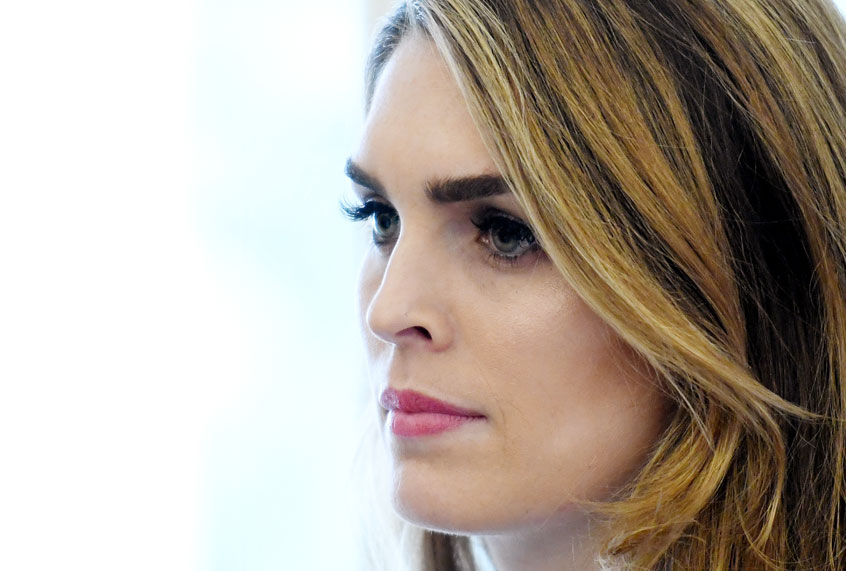When Hope Hicks, a former aide who was exceptionally close to President Donald Trump, testified before the House Judiciary Committee, it was largely an exercise in obfuscation. Democrats capitulated to demands that she testify behind closed doors, and administration officials were present to stop her from answering a stunning number of questions about her time in the White House with an extremely flimsy claim of executive privilege.
But one section of the transcript, first flagged to me by Vox’s Andrew Prokop, jumped out as an especially damning exchange that strengthens the already powerful case that Trump is guilty of federal crimes.
It wasn’t about Trump’s obstruction of justice or the behavior discussed in former special counsel Robert Mueller’s report, which has been the focus of the coverage of Hicks’s testimony. Instead, it concerned the other set of crimes in which the president has been implicated: the criminal hush money payments made to two women in the run-up to the 2016 election, violating campaign finance laws.
Trump’s former lawyer Michael Cohen has already pleaded guilty to facilitating these payments, which constituted campaign contributions that went unreported and were, in fact, illegally concealed. Cohen has already provided the House with evidence that Trump reimbursed him for the payments while in office. And, while pleading guilty to the charges, Cohen said he carried out the criminal payments at Trump’s direction — an indication that prosecutors in the Southern District of New York found this claim credible.
And when Hicks testified Wednesday to the Judiciary Committee, her testimony confirmed key facts that would be necessary to prove Trump committed a crime.
To see why, it’s important to realize why the payments were criminal. Campaign finance laws require candidates to report all expenditures on their campaigns. As SDNY alleged, and Cohen and the judge overseeing his case agreed, the payments to Karen McDougal and Stormy Daniels in the months and weeks before the election were intended to help the then-candidate’s chances of winning by keeping the women silent about the affairs they said they had with Trump. These contributions by Cohen himself (later reimbursed by Trump and reportedly disguised as a legal retainer) and by American Media, Inc., were never properly reported and, indeed, were intentionally concealed. This is part of the reason Cohen is in jail.
To deflect from these charges, Trump’s lawyers and defenders have contradicted Cohen. They don’t deny that the payments were made but that they were for a campaign purpose. Instead, they say they were made for a personal reason: to protect Trump’s marriage.
“I can produce an enormous number of witnesses that say the President was concerned about how it would affect his children, his marriage,” Trump lawyer Rudy Giuliani has said. (Unfortunately for Giuliani, he has also made comments that are inconsistent with this defense, but if Trump’s case ever made it to trial, one assumes his attorneys would stick to a script.)
They claimed that this was just the kind of thing Cohen did for Trump all the time and on his own, for the purpose of protecting Trump’s marriage. They’ve even suggested that Cohen made the payments without notifying Trump, though a recording has shown that to be false.
But Hicks’s testimony blows these excuses out of the water. One questioner pressed Hicks on an exchange she had with Cohen:
Q: It’s another text message exchange between yourself and Michael Cohen, November 5th, 2016. Do you recall what you were discussing in this exchange? Would it be helpful to read out loud into the record? I just was going to spare you, but —
HICKS No. No. That’s okay. Thank you. Yes, I remember. We were discussing the traction the Wall Street Journal story regarding Karen McDougal was getting.
Q: So when you say — I guess Cohen sent to you, “Keep praying!! It’s working!” When he says “it’s working,” do you recall what he meant by that?
HICKS: I guess that our prayers were being answered.
Q: When you made statements during the campaign that the President did not have any relationship with Stormy Daniels, did you have a basis for saying that? Did the President tell you that he did not have a relationship?
HICKS: Again, I was relaying information from the reporter to the different parties involved, primarily Michael and Mr. Trump, and that was the response that was dictated to me. I didn’t ask 268 about the nature of the relationships.
Now, the excuse that the hush money expenditure was merely a personal matter unrelated to the campaign is already highly dubious, given how close the payments were made to Election Day. And Cohen, of course, by pleading guilty, has admitted that the intention of the payments was to influence the campaign, though Trump’s defenders just say Cohen is a liar.

